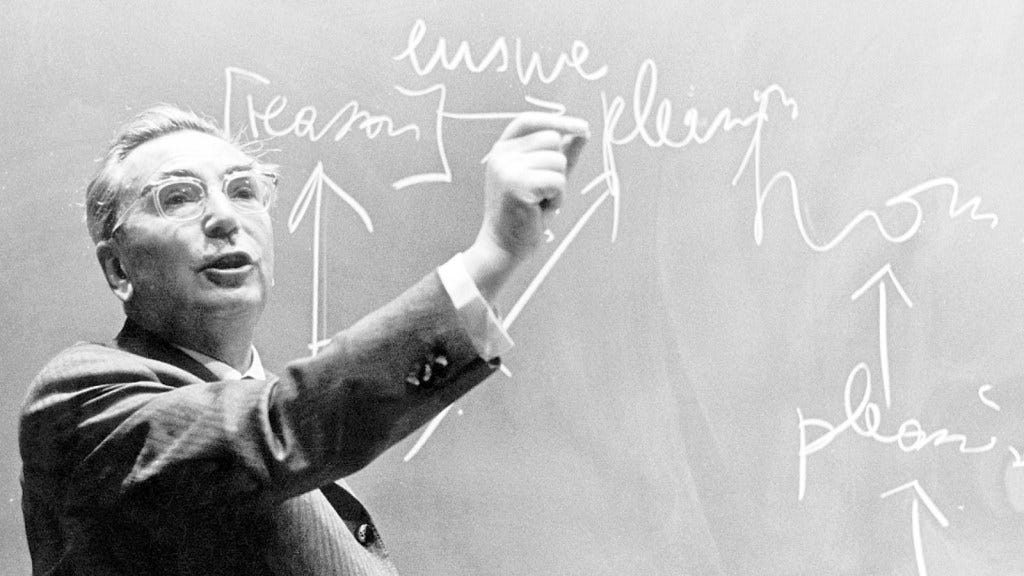The Will to Meaning: Viktor Frankl's Powerful Alternative to Happiness
In a world often fixated on the pursuit of happiness, the Austrian psychiatrist and Holocaust survivor Viktor Frankl offered a profound and enduring alternative: the will to meaning. His life, marked by unimaginable suffering, became the very foundation for Logotherapy, a school of psychotherapy centered on the human drive to find meaning and purpose in existence. Frankl argued that this innate drive, not the fleeting pursuit of pleasure, is the primary motivational force in human beings.
The Crucible of Auschwitz
Frankl's theories were not born in the sterile quiet of a university office, but forged in the hellish landscape of Nazi concentration camps, including Auschwitz, where he was registered as prisoner 119,104. Stripped of everything – possessions, identity, dignity, and loved ones – Frankl made a critical observation. Survival, he noted, wasn't solely determined by physical resilience or youth. A crucial factor was the presence of a "why" to live for, a sense of future purpose or meaning that could sustain individuals through the darkest hours. Those who lost their sense of meaning, who could see no future task, relationship, or purpose awaiting them, were often the first to succumb, physically and mentally.
Everything can be taken from a man but one thing: the last of the human freedoms – to choose one’s attitude in any given set of circumstances, to choose one’s own way.
Logotherapy: Finding Meaning in Life
From these harrowing experiences, Frankl developed Logotherapy (from the Greek "logos," meaning "meaning"). It posits that life has meaning under all circumstances, even the most miserable ones. Humans possess an intrinsic desire to find this meaning, and they have the freedom to activate this will. Frankl identified three primary avenues through which individuals can discover meaning:
1. By creating a work or doing a deed: Finding purpose through achievement, contribution, creativity, or dedication to a cause or task.
2. By experiencing something or encountering someone: Discovering meaning through appreciating beauty in nature or art, or through experiencing relationships and love for another person.
3. By the attitude we take toward unavoidable suffering: This is perhaps Frankl's most radical and powerful insight. When faced with a situation that cannot be changed, meaning can still be found in the way we choose to respond to that suffering.
The Last of the Human Freedoms
This third path highlights what Frankl termed "the last of the human freedoms." Even when external liberty is utterly extinguished, as it was in the camps, an individual retains the ultimate freedom to choose their inner stance, their attitude towards their fate. This internal freedom cannot be taken away. It is the power to decide how circumstances will affect you, to maintain dignity and find meaning even amidst profound suffering. This choice, Frankl insisted, allows individuals to rise above their predicament and turn tragedy into a personal triumph.
Tragic Optimism: Saying Yes to Life
Frankl championed the concept of "tragic optimism" – an optimism in the face of tragedy. It involves saying "yes" to life despite its inherent pain, suffering (the "tragic triad" of pain, guilt, and death), and transience. Tragic optimism encourages us not to despair but to find meaning precisely within these limitations. It means transforming suffering into a human achievement, deriving guilt into an opportunity for change and self-improvement, and viewing life's transience as an impetus for responsible action. Knowing our time is limited should motivate us to make the most of it, fulfilling our unique potential for meaning.
Why Meaning Matters More Than Happiness
For Frankl, happiness is not something to be pursued directly; rather, it ensues as a byproduct of finding meaning. Chasing happiness itself often leads to frustration, a phenomenon he termed "hyper-intention." When we focus solely on achieving a state of happiness, it becomes elusive. Meaning, however, provides a deeper sense of fulfillment and resilience. It anchors us, especially during inevitable hardships. A life imbued with meaning can withstand suffering in a way that a life solely dedicated to avoiding discomfort cannot.
Frankl's Enduring Legacy
Viktor Frankl's insights, documented powerfully in his book "Man's Search for Meaning," remain incredibly relevant. In a world grappling with uncertainty, anxiety, and existential questions, his emphasis on the human quest for meaning provides a vital anchor. He reminds us that even when we cannot change our circumstances, we always retain the freedom to choose our response. The capacity to find meaning is inherent within us, waiting to be discovered through our actions, our connections, and our attitude towards life itself. Exploring Frankl's work offers profound lessons on resilience, purpose, and the enduring strength of the human spirit. For a deeper dive into his experiences and the development of Logotherapy, consider exploring resources that delve into his time in Auschwitz and the core tenets of his philosophy, such as this exploration found here:
Frankl's message is not one of naive optimism, but one of profound hope grounded in the human capacity for meaning. It challenges us to look beyond fleeting happiness and ask ourselves the more fundamental question: What is the meaning of my life?




It's always revealing when I find texts that link to my art. Going through pain, sorrow, vulnerabilities and fragilities, all constants in my works, I believe helps us finding strengths and deeper meanings than numb happiness. In our palliative society we avoid suffering by all means, becoming vulnerable to even the most simple adversity. I don't advocate for a catastrophic life, of course not, but I stand against the silencing of pain. It's scary to see this happening on social media, and art becoming more and more compliant. My art goes turned down because dark, "anxiety inducing", and all I am doing is giving voice to all of those who are discriminated because their physical appearance.
Some questions....
https://www.psychologytoday.com/us/blog/authoritarian-therapy/201703/is-it-ok-criticize-saint-humanizing-viktor-frankl
https://www.psychologytoday.com/us/blog/on-authoritarian-therapy/201708/criticizing-a-saint-part-2